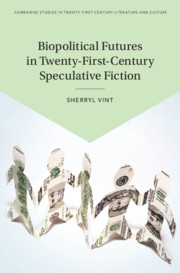Book contents
- Biopolitical Futures in Twenty-First-Century Speculative Fiction
- Cambridge Studies in Twenty-First-Century Literature and Culture
- Biopolitical Futures in Twenty-First-Century Speculative Fiction
- Copyright page
- Contents
- Acknowledgments
- Introduction
- Chapter 1 Suspending Death, Reinventing Life
- Chapter 2 The New Flesh
- Chapter 3 Capital Reproduction
- Chapter 4 Surplus Value
- Chapter 5 Life Industries
- Chapter 6 Living to Work
- Chapter 7 Life Optimized
- Chapter 8 Surplus Vitality and Posthuman Possibilities
- Conclusion
- Notes
- Bibliography
- Index
Chapter 7 - Life Optimized
Pharmaceutical Health and Disposable Bodies
Published online by Cambridge University Press: 16 September 2021
- Biopolitical Futures in Twenty-First-Century Speculative Fiction
- Cambridge Studies in Twenty-First-Century Literature and Culture
- Biopolitical Futures in Twenty-First-Century Speculative Fiction
- Copyright page
- Contents
- Acknowledgments
- Introduction
- Chapter 1 Suspending Death, Reinventing Life
- Chapter 2 The New Flesh
- Chapter 3 Capital Reproduction
- Chapter 4 Surplus Value
- Chapter 5 Life Industries
- Chapter 6 Living to Work
- Chapter 7 Life Optimized
- Chapter 8 Surplus Vitality and Posthuman Possibilities
- Conclusion
- Notes
- Bibliography
- Index
Summary
This chapter addresses discourses of self-optimization and especially pharmo-chemical reconfigurations of life. Drawing on anthropological critiques of clinical drug trials and the economic hegemony of chemical corporations that Kaushik Sunder Rajan calls pharmocracy, this chapter thinks through how health and profit intersect in these industries, and what this nexus means for concepts of sociality and governance. It reads three speculative texts: Annalee Newitz’s Autonomous makes visible the ongoing production of inequality through the uneven distribution of pharmaceuticals, for both treatment and for enhancement; Sue Burke’s Semiosis envisions a new kind of society made possible through a posthumanist ethos that engages other species, including plants, through rubrics of collaborative survival instead of accumulative appropriation; and Thomas King’s The Back of the Turtle contrasts Western and Indigenous epistemologies and scientific practices in a tale about a biochemical company and a catastrophic chemical spill. Each suggest ways to optimize the social vitality of life rather than its economic productivity, and the hopeful communities they propose demonstrate how a posthumanist dispositif of personhood enables this new orientation toward life and the living.
Keywords
- Type
- Chapter
- Information
- Biopolitical Futures in Twenty-First-Century Speculative Fiction , pp. 157 - 181Publisher: Cambridge University PressPrint publication year: 2021

